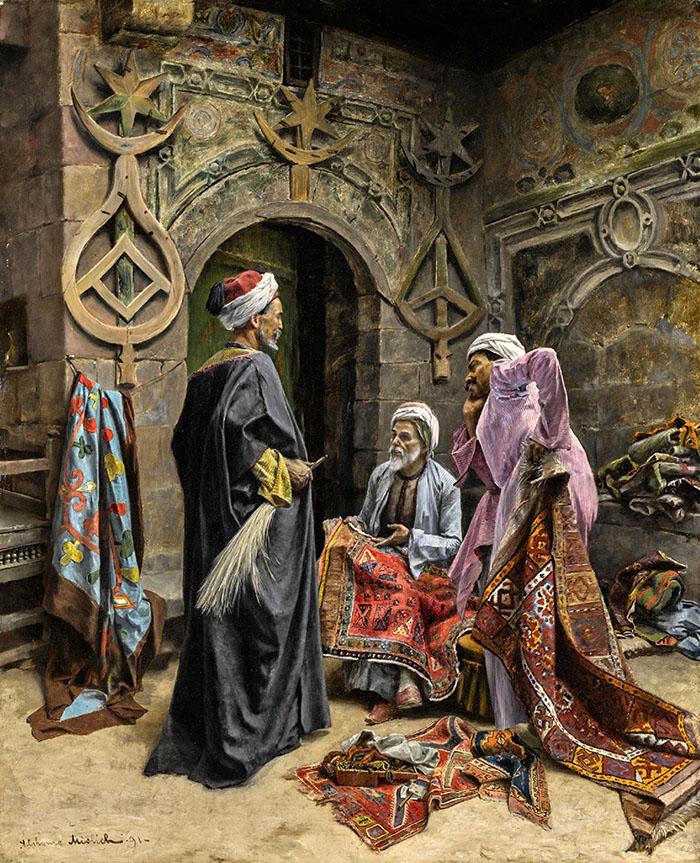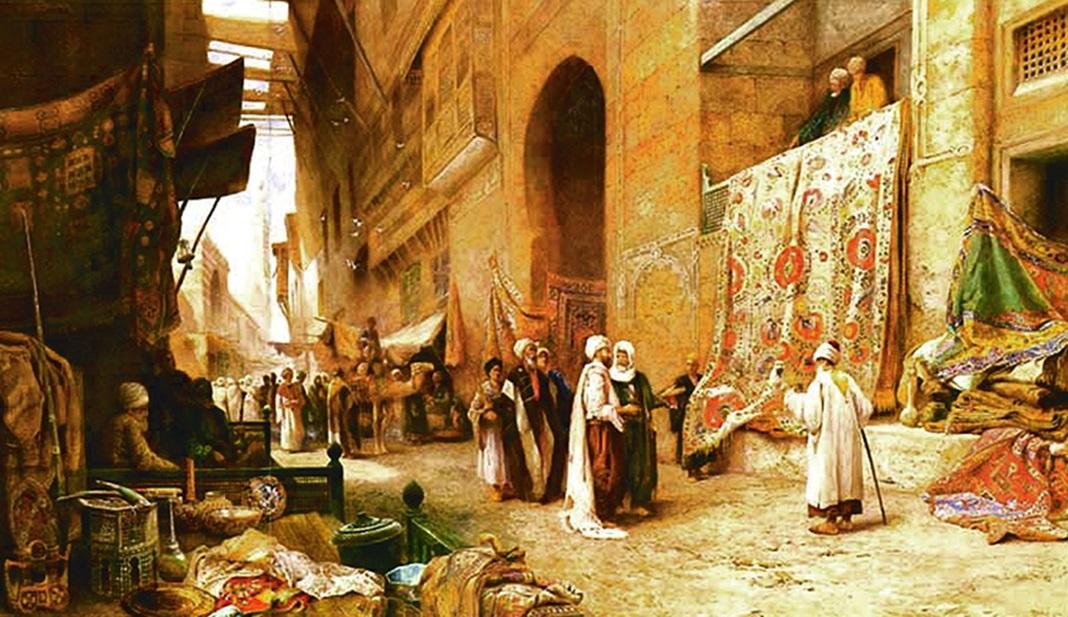The following is an excerpt from Imam al-Ghazali’s book, Kitāb Ādāb al-Kasb wal-Maʿāsh (The Book on the Morals of Earning and Living), translated by Prof. Adi Setia, and edited for publishing on Muslim Ink.
Be Just and Avoid Harming Others
Anything by which the transactor is harmed is oppression. Justice (al-ʿadl) is that a Muslim is not harmed by his brother. The general precept here is that “one desires not for his brother except what he desires for himself.” One should not engage other people in any transaction that would have caused hardship to him were he himself to be engaged in it. Rather, one should view as equally valuable one’s own dirham and the dirham of one’s brother.
Some of them said, “Whosoever sells something to his brother for a dirham which he himself would not have deemed proper to buy…, then he has indeed abandoned giving the good counsel (al-nuṣḥ) that is enjoined in transaction…”
This is the gist of this division. Its explanation can be summed up in four issues:
- Do not extol the merchandise (as-silʿa) for what is not in it;
- Do not conceal any of its defects (ʿuyūb) or hidden features at all;
- Do not conceal anything of its [true] weight (wazn) or measure (miqdār);
- Do not conceal anything of its price, such that if the buyer were to know about it he would not have wanted it.
[Also read: The Importance Of Working And Earning In Islam]
Act in Good Faith and Give Good Counsel
The obligation of acting in good faith (an-nuṣḥ) by revealing defects is proven in the narration of the pledge of allegiance (bāyaʽa) that the Prophet ﷺ took from Jarīr. When Jarīr proceeded to depart (after the pledge), the Prophet ﷺ suddenly caught hold of his shirt and charged him to act in good faith to every Muslim.
Thereafter, whenever Jarīr went about to sell his merchandise, he would point out its defects and give the option [of cancelling the purchase]. He would say, “If you wish you may take it, and if you wish you may leave it.” People said to him, “You will not be able to sell if you do like this.” Jarir replied, “We have pledged ourselves to the Messenger of Allah ﷺ to act in good faith with every Muslim.” [al-Bukhārī and Muslim]
“We have pledged ourselves to the Messenger of Allah ﷺ to act in good faith with every Muslim.”
Once Wāthila ibn al-Asqaʿ, a Sahabi, was standing by when a man sold a camel for 300 dirhams. Wāthila thought nothing of it until the buyer had left with the camel, then something occurred to him and he rushed after the man and began to speak earnestly to him, “Did you buy this camel for meat or for riding?”
The man said, “Indeed, for riding.” Wāthila said, “I have noticed a perforation in its hoof, and it will surely not be able to continue on its way.”
The man turned back to return the camel. The seller discounted one hundred dirhams from its [original sale] price and said to Wāthila, “May Allah have mercy on you. You have spoiled my sale…”
Wāthila said, “We have pledged ourselves to the Messenger of Allah ﷺ to act in good faith with every Muslim.” Wāthila then said, “I have indeed heard the Messenger of Allah ﷺ say: ‘It is not licit for a seller to sell something unless he makes known its shortcomings, and it is not licit for someone who knows that except that he tells about it.’” (al-Ḥākim and al-Bayhaqī)
Therefore, they understood that part of giving good counsel (an-nuṣḥ) is that one does not desire for his brother except what he desires for himself. They did not consider giving good counsel to be something [merely] virtuous and additional piety, but rather they believed it to be the [very foundational] requirements of Islam that were included in their pledge of allegiance.
This matter is quite hard for most people, and because of that they opted to seclude themselves in worship and withdraw away from people. Fulfilling the rights of Allah along with socializing and transacting [with people] are a striving [against the self] that cannot be carried out except by the truthful (aṣ-ṣiddīqūn).
Show Benevolence (Iḥsān) in Pricing
The seller [or buyer] should not exact an opportunistic price from his counterpart that he would not normally exact [for the type of merchandise concerned].
Opportunistic-pricing is allowed in principle because selling is for making profit; and this is not possible except through some degree of opportunistic-pricing, but one should be reasonable.
If the buyer offers a higher price than what is normally profitable for the seller—whether due to the buyer’s great desire or need for the item—then the seller should decline the offer (and insist on the normal price). This will be considered goodwill or benevolence (iḥsān).
However, as long as there is no deception involved, then it is not oppression to take the increased payment. Some scholars are of the view that opportunistic-pricing (al-ghabn) by increasing the price to more than one third of the [fair price] will necessitate giving the buyer the choice [to rescind the sale], but we do not hold the same view.
Yūnus ibn ʿUbayd had some suits of clothes of different prices, and for each suit he had set its price. He went away to pray and left behind his nephew in the shop.
A countryman (aʽrābī) then came [to the shop] and requested a suit of clothes for 400. The nephew displayed to him a suit priced at 200. The man deemed it good, liked it, and bought it for 400. He left the shop and Yūnus met him [in the streets] and recognised his suit of clothes. He asked the countryman, “How much did you pay for it?” The man replied, “400.” Yunus said, “It is not worth more than 200. Go back so that you may return it.”
The countryman said, “This is worth 500 in my region, and [moreover] I am pleased with it.” Whereupon Yūnus said to him, “Go back, for indeed giving good counsel (an-nuṣḥ) in the religion is better than the world and all that it contains.”
They returned to the shop and Yūnus gave him back the 200. He then reprimanded his nephew and said, “Are you not ashamed? Do you not fear Allah? How could you profit by the value of the price and abandon giving good counsel to Muslims?”
His nephew said, “By Allah! He did not take it except after being pleased with it.” He said, “Well then, why didn’t you desire for him what you would have desired for yourself?”
In the above incident, if there had been any concealment of the [actual] price or any deception, then it would have been oppression. In a hadith [it is stated], “Overcharging the innocent is unlawful.” (Aṭ-Ṭabarānī, al-Bayhaqī)
Az-Zubayr ibn ʿAdī used to say, “I came to know 18 persons from the Companions, and none of them deemed it nice to buy meat for [less than] one dirham.”
If the overcharging does not involve deception, then it is abandoning goodwill [albeit not oppressive]. However, rarely is opportunistic-pricing accomplished except through some form of deception and concealing the current price.
Great Example of Genuine Goodwill (Iḥsān)
As-Sariyy as-Saqaṭī bought a load of almonds for 60 dinars and wrote three dinars as his profit margin in his ledger. Then the market value of almonds rose to 90 dinars. A broker came and asked for the almonds. As-Sariyy said, “For 63.” The broker, who was also an upright person, said, “The price of almonds has now reached 90 dinars!”
As-Sariyy said, “I have made a resolution that I will not undo. I shall not sell it except for 63 dinars.” The broker said, “I have made a pact between myself and Allah that I will not defraud a Muslim. I shall not take it from you except for 90 dinars.”
The narrator said, “[In the end,] the broker did not buy from him, and as-Sariyy did not sell to him.” This is genuine iḥsān from both parties, due to their knowledge about the reality of the situation.
[Also read: How To Check If A Stock Is Halal]
Maintain Integrity in Commerce
Commerce is the yardstick of true men, by which a person’s religion is put to the test… Hence, it was said: “Do not be lured by the person’s modest clothing (as a mark of apparent piety) or by his waistcloth raised above the ankles, or his brow on which a dark mark is impressed; but by the dirham assess his passion or caution.”
Because of this it has been said, “If a man is praised by his neighbors in the town, by his companions in a journey, and by his transactors in the marketplaces, then do not entertain misgivings about his integrity.”
Commerce is the yardstick of true men, by which a person’s religion is put to the test.
A witness was giving testimony in the presence of ʿUmar ibn al-Khaṭṭāb (Allah be pleased with him) and ʿUmar said, “Bring me someone who knows you.” He brought a person who extolled his goodness.
ʿUmar asked, “Are you his close neighbor who knows his comings and goings?” He said, “No.”
ʿUmar said, “Have you been his companion on a journey in the course of which you discerned his good character traits?” He said, “No.”
ʿUmar said, “Have you ever conducted transactions with him in dinars and dirhams by which you discerned his conscientiousness?” He said, “No.”
ʿUmar said, “I suspect you [only] saw him standing in the mosque, engrossing people’s attention with [his reading of] the Qurʾān, while bowing and raising his head now and then?” He said, “Yes.”
ʿUmar then said, “Go, for you do not know him.” Then he said to the witness, “Go and bring me someone who [really] knows you.”
Limited free articles. Subscribe for full access.








 Dr. Bilal Philips
Dr. Bilal Philips